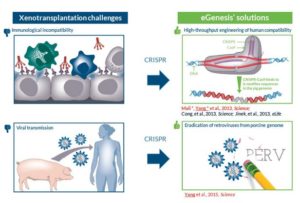 The field of xenotransplantation – implanting organs from one species into another – has accelerated dramatically since the discovery of the CRISPR gene editing tool a few years ago. Hurdles that previously seemed insurmountable are now not so daunting. The latest landmark development in the field comes from a team of scientists who successfully created genetically modified piglets free of 25 retroviruses that are generally present in pigs but thought to cause harm to humans.
The field of xenotransplantation – implanting organs from one species into another – has accelerated dramatically since the discovery of the CRISPR gene editing tool a few years ago. Hurdles that previously seemed insurmountable are now not so daunting. The latest landmark development in the field comes from a team of scientists who successfully created genetically modified piglets free of 25 retroviruses that are generally present in pigs but thought to cause harm to humans.
There are several obvious problems scientists must overcome before successfully being able to transplant pig organs into humans. Despite pig organs posing as prime candidates for human transplantation considering their similar size and function, they generally, and unsurprisingly, trigger significant immune rejection responses in humans.
This first problem is being tackled by several scientists including pioneer transplant researchers Joseph Tector and David Cooper, both currently based at the University of Alabama at Birmingham. Both scientists have made major breakthroughs in identifying key genes in pigs that trigger human immune rejections. Using CRISPR they created pigs with those key genes suppressed and believe human trials using these implanted […]












My Mother had a pig’s heart valve placed into her heart back in the early 1980’s. It was eventually removed and replaced with a mechanical valve which kept her alive until she died at the age of 83. Both valves worked quite well. I’ve read that bovine valves have also been used successfully and all these were done without complications.